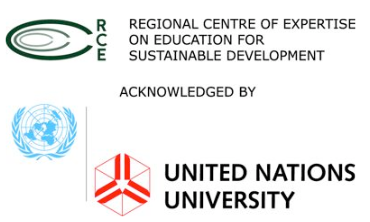
RCE Bulletin
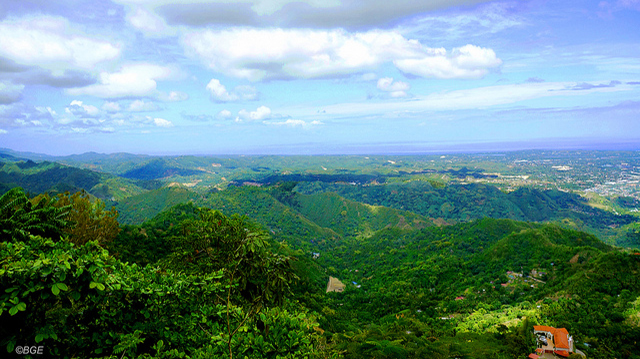
Photo credit: Brian Evans / CC BY-ND 4.0
Hosted by RCE Cebu, the 11th Global RCE Conference will take place in Cebu, the Philippines, from 7-9 December, 2018, under the theme 'Education for the Sustainable Development Goals'. All 17 of the Sustainable Development Goals (SDGs) will take centre stage, as the SDGs offer RCEs diverse entry points to tackle sustainable development issues relevant to their respective regions through education and training at all levels.
The programme for this year's Global RCE Conference will be divided into four components: case presentations, plenaries, regional sessions, and workshops. We are pleased to announce an open call for:
- Case presentations of ESD projects from RCEs, which this year will run as three parallel streams; Planet, People, and Prosperity; and
- Workshop sessions run by RCEs.
SDG 4 (Quality Education, in particular Target 4.7 in relation to Education for Sustainable Development) and SDG 17 (Partnerships for the Goals) will be the cross-cutting themes for all sessions.
Open Call: For more details, view the open call here.
Registration: To register, please click here. For those who are not able to access the webpage, please submit the Registration Form and email it to RCE Cebu (ceburce@gmail.com) and the Global RCE Service Centre (rceconference@unu.edu).
Deadline: For those NOT applying for funding support, the deadline to register is 11:59pm, Sunday 4th November, 2018 (PHT).
For those applying for funding support, please note the earlier registration deadline of 11:59pm, Sunday 7th October, 2018 (JST).
Some important changes to the Annual Reporting section of the RCE Portal have recently been made. In previous years, RCEs have been asked to submit an Annual Report through the RCE Portal. Instead of completing an Annual Report, we now ask that you do the following annually:
- Keep your RCE Profile up-to-date (by submitting this form to the Global RCE Service Centre at rceservicecentre@unu.edu when you have any changes); and
- Ensure you submit your RCE Projects on the RCE Portal here at least once a year (at any time throughout the year). When submitting RCE Projects, please make sure you have your login details ready (username and logins can be found here). A video tutorial is available to guide you through the process.
Should you have any questions, please do not hesitate to contact the Global RCE Service Centre.
The Global RCE Service Centre announces a call for nominations for the 7th annual RCE Awards. RCEs are encouraged to nominate one or more of their ESD projects for the award; ESD projects should illustrate how RCEs address local sustainable development challenges, and therefore provide an example of how the Sustainable Development Goals (SDGs) can be implemented at the local level through quality education. They should also demonstrate how an RCE is promoting multi-stakeholder learning processes through policy dialogue, research and collaborative partnerships. Award recipients will be featured at the 11th Global RCE Conference this December in Cebu, the Philippines.
To apply:
- Submit an RCE Project (video tutorial available here), and at the bottom of the form, please tick the box underneath the heading 'RCE Award 2018' before saving (Please note: projects submitted since November 2017 are eligible to be nominated for the award. Please go into your existing project, go into 'edit' mode and tick the same box at the bottom of the form).
- You will then be redirected to the RCE Award form on a new page. Complete the form and click submit.
Details on categories for the awards, eligibility, criteria, and the format for submission can be found here. Submission must be done online via the RCE Portal by 11:59pm, 31 October, 2018 (JST).
Photo credit: Chancellor College
The 8th African RCE Meeting was held at the Chancellor College in Zomba, Malawi from 8th-10th August, 2018. The meeting was hosted by RCE Zomba, with support from the United Nations Institute for the Advanced Study of Sustainability (UNU-IAS), the Government of Malawi, the network LEAD, the University of Malawi, and Malawi Environmental Endowment Trust under the theme, 'Upscaling the Impact of African RCEs in Actualising the SDGs'. The Global RCE Service Centre would like to express our appreciation to RCE Zomba and its stakeholders for their support and efforts in making the event a success.
Representatives from the African RCEs and other institutions working on sustainability issues met to share experiences and discuss the ways towards amplifying the Education for Sustainable Development (ESD) actions, to accelerate the achievement of the Sustainable Development Goals (SDGs) at local, regional and global levels. Read more about the event here.
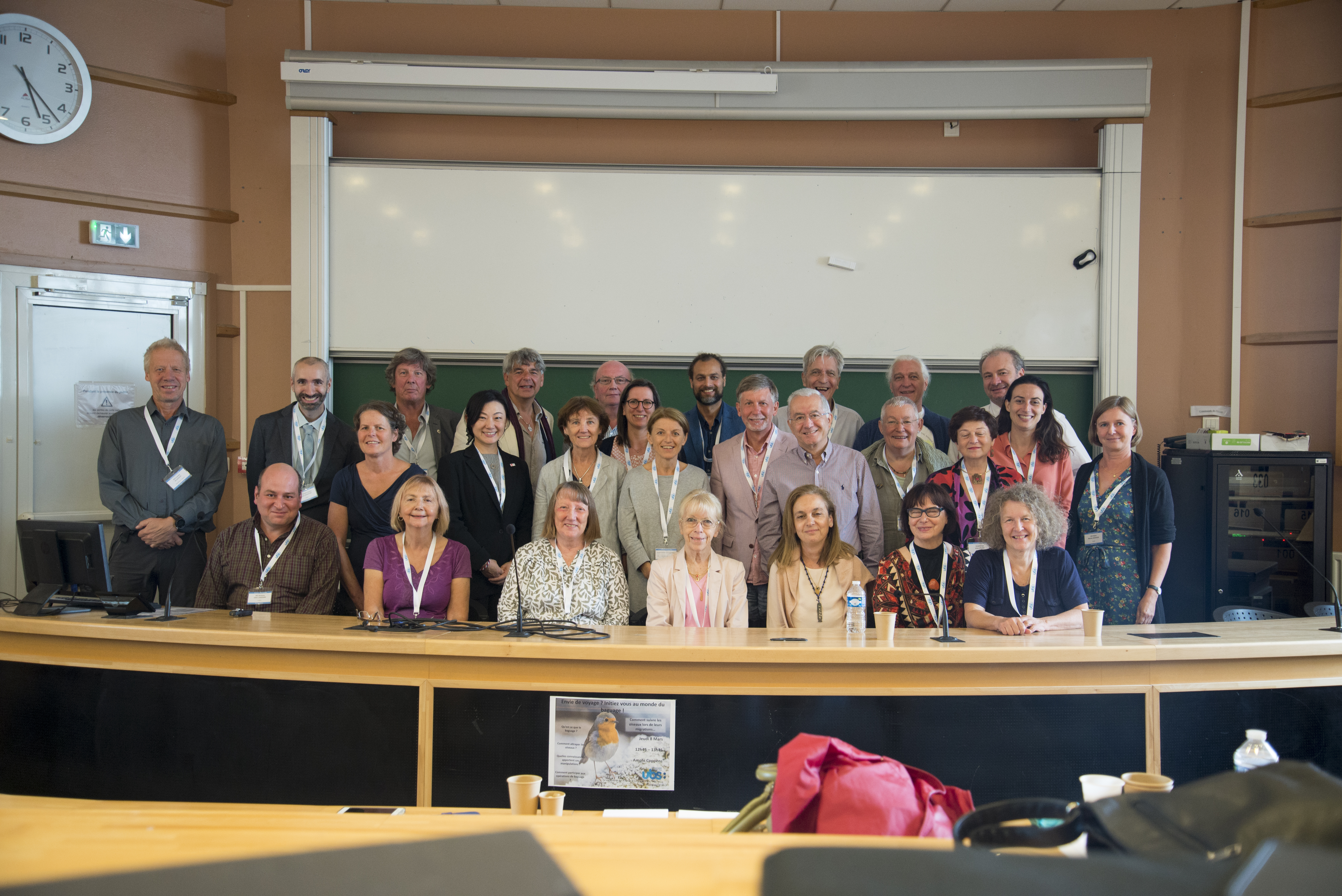
Photo credit: Jiri Dlouhy
Sixteen RCEs from 12 countries recently gathered in Vannes, France, for the 2018 European RCE Meeting, hosted by RCE Brittany from 29th-31st August, 2018. Organised under the theme 'ESD and the Sustainable Development Goals (SDGs) - how can RCEs coordinate both to achieve sustainable development?', this meeting was the largest meeting of RCEs in Europe that has occurred to date. The Global RCE Service Centre wishes to extend a special thank you to Françoise Laveuve and the rest of the team at RCE Brittany for their tremendous commitment to the outstanding programme and hospitality.
Teacher training, technical and vocational education and training (TVET), and working with capacity building in vulnerable communities were among some of the themes discussed. RCEs from around the continent presented a number of their outstanding ESD projects from over the past twelve months, including projects involving partners from higher education, local government, the private sector, and many more. Read more
Sincerely,
The Global RCE Service Centre
Upcoming Events
25-27 October, 2018, Posadas, Argentina
The 7th Americas RCE Meeting will be hosted by RCE Cuenca del Plata in Posadas, Misiones, Argentina next month with the support of the United Nations University Institute for the Advanced Study of Sustainability (UNU-IAS). The theme for the meeting will be 'ESD, Conservation and Climate Change in the 2030 Agenda'. Stay tuned in upcoming months for a report and outcomes from the event.

17-19 October, 2018, Brussels, Belgium
The Future Forward Summit aims to bring together people from all over the world who believe that higher education has an important role to play in creating a sustainable future. Building such a system that contributes to a sustainable future requires a strong community and cross-border cooperation. Expect a conference that will explore the inspiration driving game-changing pioneers and learn how others have dealt with common challenges.
Highlights of the programme include: a keynote by prizewinning documentary filmmaker Emma Lesuis about how she visualises wicked problems; Dr Hans Bruyninckx, Executive Director of the European Environment Agency sharing his strong vision on the future of higher education; and Future Forward Talks (conversations between two inspiring people about what drives them to make a difference in higher education).
For more information, take a look at the programme here. Registrations can be made via this page here.
Open Calls
The Institute for Global Engagement & Empowerment (IGEE) at Yonsei University in Seoul, in collaboration with the Ban Ki-moon Centre for Global Citizens in Vienna, will hold the second annual Global Engagement & Empowerment Forum on Sustainable Development (GEEF) on 14-15 February, 2019, at Yonsei University. As IGEE's signature annual event, GEEF is the cornerstone for fulfilling the mission and vision of the organisation - accomplishing the 2030 Agenda for Sustainable Development. GEEF will serve as a platform for world leaders, academia, practitioners, and the young generation to collaborate towards that goal.
Interested presenters must submit an abstract of at least 300 words but not exceeding 500 words, in English, no later than 15 October, 2018, as an email attachment to geef2019.papers@gmail.com. Abstracts should be directly relevant to one of the UN Sustainable Development Goals (SDGs). For example, parallel sessions during GEEF 2018 covered various topics including water management; climate change adaptation; responsible consumption and production; social economy and community development; youth's path to engagement and empowerment; safeguarding youth in the digital age; and ICT for higher education.
Abstracts should be single-spaced, within one page, and include the following information: (1) author(s) name, position, affiliation, and official address; (2) contact information of corresponding author(s); and (3) title and abstract of the paper. After an anonymous review by the GEEF 2019 Scientific Committee, abstract decision letters will be sent via email no later than 15 November, 2018 to the authors invited to give oral presentations. A full paper must be submitted to geef2019.papers@gmail.com no later than 15 January, 2019. Registration deadline for presenters is 31 January, 2019.
Travel grants can be considered for international scholars and graduate students from non-OECD countries. For questions about the possible travel grants, please contact geef2019.papers@gmail.com.
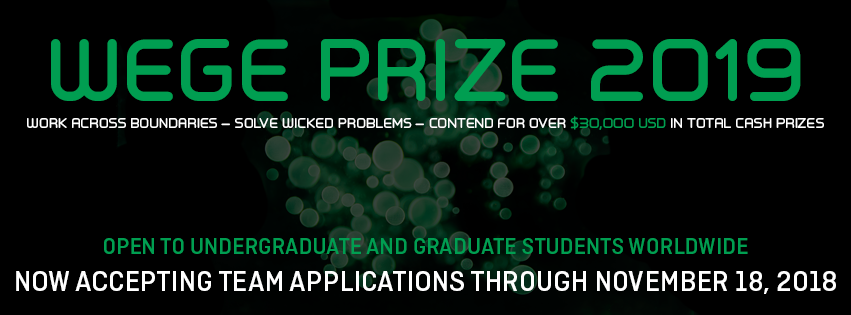
Photo credit: Wege Prize
Wege Prize, organised by Kendall College of Art and Design’s Wege Center for Sustainable Design with support from the Wege Foundation, is an annual competition that ignites game-changing solutions for the future by inspiring college/university students around the world to collaborate across institutional, disciplinary, and cultural boundaries to redesign the way economies work. Participants contend for over $30,000 (USD) in total cash prizes, all while helping to show the world what the future of problem-solving looks like.
Team applications are now being accepted for the Wege Prize 2019. Any full-time undergraduate or graduate student in the world is eligible to participate. More information can be found here. The deadline is 18 November, 2018 and applications can be submitted here.
Be the first to hear about key dates, deadlines, and announcements for the 2019 competition by signing up to the Wege Prize mailing list here.
The Global RCE Service Centre is inviting RCEs from around the world to contribute to a publication on Disaster Risk Reduction (DRR) in Education for Sustainable Development (ESD). Any authors interested in sharing an ESD project related to DRR are asked to:
1. Send an expression of interest to the Global RCE Service Centre (RCEServiceCentre@unu.edu) as soon as possible
2. Complete the ESD project template in full and submit it to the Global RCE Service Centre (RCEServiceCentre@unu.edu) by 30 November, 2018.
Should you wish to join this project, all authors must declare from the outset the novelty of the content, that no parts of the manuscript have been published, nor are currently being considered for publication elsewhere, and that the authors are willing to provide the required information in the guidelines provided in the template, including securing the permission of all organisational actors involved in the project in addition to any established timelines.
If you have any specific questions for clarification, please contact Dr. Philip Vaughter (vaughter@unu.edu) with a copy to the Global RCE Service Centre.
Latest News
Photo credit: RCE Greater Dhaka
On 13th September, 2018, a one-day workshop titled 'Adaptation of Global Citizenship Education (GCE) in Bangladesh for ESD' was held at IUBAT (International University of Business Agriculture and Technology) in Dhaka, Bangladesh. Jointly organised by the Centre for Global Environmental Culture (CGEC), RCE Greater Dhaka, and UNESCO Dhaka, the aim of the workshop was to gather feedback from education experts, academicians, government, and NGOs, on the translation of an adaptive GCE guide into Bengali.
The guide, produced by CGEC and RCE Greater Dhaka for Bangladesh and Bengali communities throughout the world, was adapted from a UNESCO publication titled Global Citizenship Education: Topics and learning objectives, which was developed to provide pedagogical guidance to UN Member States on integrating GCE into their education systems.
Mrs. Sun Lei, Education Specialist at UNESCO Dhaka was the special guest, whilst ESD experts in Bangladesh were also in attendance at the workshop. Feedback was very positive, with comments to be incorporated into an updated version. Suggestions were also made to undertake another joint project on ESD incorporating RCE Greater Dhaka's activities in the future.
ESD BOOKS, PUBLICATIONS AND OTHER
The National Union of Students (NUS) in the UK has been conducting research around students' attitudes towards learning for sustainable development since 2010-11. Over the years, the findings have been consistent; students expect their universities to be taking action for sustainable development, both in terms of their own impacts but also in terms of the teaching provided to students.
This year, during the spring of 2018, the NUS partnered with a number of international organisations to run an online worldwide survey, to see if the same sentiments were shared globally. Over 3,200 students responded - some of the results included:
- 91% say they agree their place of study should actively incorporate and promote sustainable development
- 70% would like to see sustainable development incorporated and promoted through all courses
- 81% say sustainable development is something they would like to learn more about
- 25% say sustainable development hasn't been covered at all by their course
- 17% rate their university as 'very good' in relation to the action it takes to limit the negative impact it has on the environment and society
- 61% would accept a salary 15% lower than average to work in a company with a good social and environmental record
- 93% say governments from across the world should do whatever it takes to address climate change
- 25% say they've never heard of the UN Sustainable Development Goals
The full report can be found here.
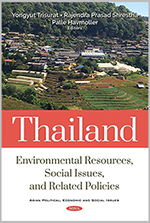
Due to be published in December 2018 by Nova Science Publishers, this publication reviews the pressures, impacts, and status of selected natural resources and environmental concerns related to Thailand, identifying key management issues and policy options in order to safeguard natural resources in the midst of rapid, dynamic anthropogenic, and environmental changes.
The concepts and lessons learned from case studies presented in this book also cover management options for achieving the designated national goals, as well as international commitments on biodiversity conservation and the Sustainable Development Goals (SDGs). Read more


